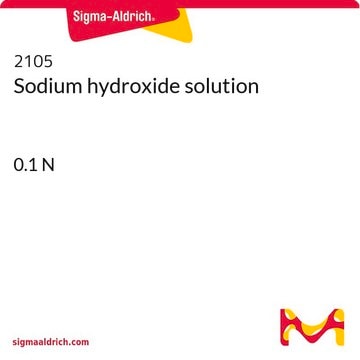About This Item
50% in H2O
suitable for EPA 533
suitable for EPA 8327
suitable for EPA OTM-45
suitable for SM 4500 - NH3
Recommended Products
Agency
suitable for DIN 38407-42
suitable for EPA 533
suitable for EPA 8327
suitable for EPA OTM-45
suitable for SM 4500 - NH3
Quality Level
vapor pressure
3 mmHg ( 37 °C)
form
liquid (viscous)
concentration
48-52% (by HCl, titration)
50% in H2O
technique(s)
HPLC: suitable
pH
14
density
1.515 g/mL at 25 °C
storage temp.
room temp
SMILES string
[OH-].[Na+]
InChI
1S/Na.H2O/h;1H2/q+1;/p-1
InChI key
HEMHJVSKTPXQMS-UHFFFAOYSA-M
Looking for similar products? Visit Product Comparison Guide
Related Categories
General description
Application
- As a dedoping reagent in the synthesis of graphene/polyaniline hybrid material.
- As a solvent in the weight loss study of aluminum by corrosion.4
- Alkaline reagent test for tannins & phenolic compounds.
- Synthesis of single crystalline zinc stannate (Zn2SnO4 and ZnSnO3) nanoparticles.
- Estimation of protein content and α-cellulose content in grain by-products.
Signal Word
Danger
Hazard Statements
Precautionary Statements
Hazard Classifications
Eye Dam. 1 - Met. Corr. 1 - Skin Corr. 1A
Storage Class Code
8B - Non-combustible corrosive hazardous materials
WGK
WGK 1
Flash Point(F)
Not applicable
Flash Point(C)
Not applicable
Choose from one of the most recent versions:
Already Own This Product?
Find documentation for the products that you have recently purchased in the Document Library.
Customers Also Viewed
Articles
LC-UV-MS workflow details teriparatide peptide mapping, including enzymatic digestion, separation conditions, and QTOF mass spectrometer identification.
LC-UV-MS workflow details teriparatide peptide mapping, including enzymatic digestion, separation conditions, and QTOF mass spectrometer identification.
LC-UV-MS workflow details teriparatide peptide mapping, including enzymatic digestion, separation conditions, and QTOF mass spectrometer identification.
LC-UV-MS workflow details teriparatide peptide mapping, including enzymatic digestion, separation conditions, and QTOF mass spectrometer identification.
Related Content
This page is intended to make it easier to find the consumables you need based on the analytical method you’re using. Methods included on this page come from the EPA, Standard Methods and ASTM.
This page is intended to make it easier to find the consumables you need based on the analytical method you’re using. Methods included on this page come from the EPA, Standard Methods and ASTM.
This page is intended to make it easier to find the consumables you need based on the analytical method you’re using. Methods included on this page come from the EPA, Standard Methods and ASTM.
This page is intended to make it easier to find the consumables you need based on the analytical method you’re using. Methods included on this page come from the EPA, Standard Methods and ASTM.
Our team of scientists has experience in all areas of research including Life Science, Material Science, Chemical Synthesis, Chromatography, Analytical and many others.
Contact Technical Service


